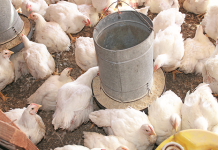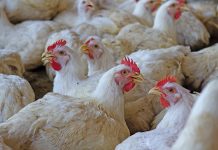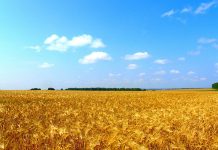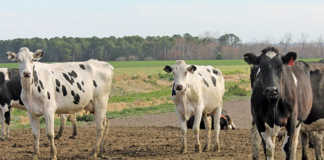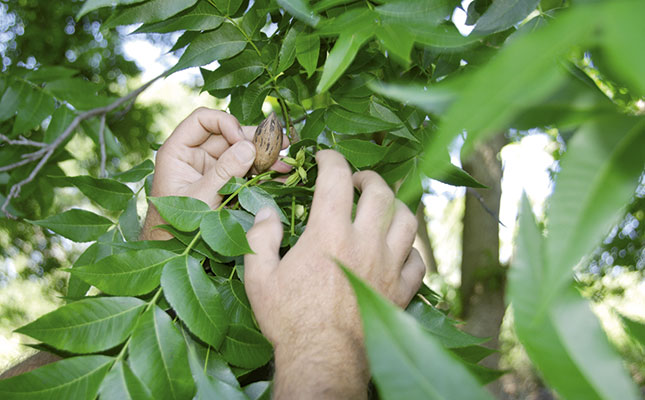
“The income from 50kg of pecan nuts harvested from two trees is equivalent to that from 1t of mealies,” says pecan nut farmer Philip Antrobus (37), the chairperson of the South African Pecan Producers Association (SAPPA) representing the interests of 280 pecan producers.
READ:Growing a valuable pecan nut orchard
Philip and his father Michael (71) farm in the Fish River Valley outside Cradock with 8km of frontage and irrigation rights on 250ha. In addition to pecans, they run a flock of 1 800 Vandor ewes and a herd of 100 Beefmaster cattle.
“Obviously anything can be made to look good on paper. The reality is that I’m eight years in debt as we’re still in the planting and growing stage,” Philip says. “This year, for example, we planted 550 pecan trees to bring our total to 6 000 trees.”
An unmatchable agricultural product “It costs around R140 000/ha to establish and grow the trees (at 100/ha),” says Phillip. “But when our 6 000 pecan nut trees on 60ha all reach their full bearing age, nature and circumstances willing, I can’t think of any other agricultural product to match this.”
Philip has been preaching the pecan gospel for years. “It’s not about bragging, but about showing what’s possible in the Karoo and elsewhere with an alternative irrigation crop. SAPPA is only 18 years old and I believe its future has massive potential. ”According to SAPPA records, the pecan nut industry in South Africa is expanding by 2 000ha/year.
The present production is around 4 000t/year unshelled. In five to six years time this will increase to between 10 000t/year and 15 000t/year. “The US is the largest producer of pecan nuts in the world with 136 000t/year to 181 000t/year, followed by Mexico with 45 000t/year. Australia and South Africa follow as young producers,” Philip says.
Core industry north of the Orange River
The pecan nut industry has its roots in Mpumalanga and KZN, but the core of the South African pecan industry today is north of the Orange River in the Vaalharts area, Hartswater, Prieska, Upington and Orania. Irrigation schemes provide much needed water in these naturally dry, hot areas. The Eastern Cape has about eight pecan nut farmers in the Fish River Valley.
Without a strong and reliable water supply, producing this extremely thirsty crop is out of the question. Philip explains that a large tree transpires between 500â„“/day to/day, and that, according to US figures, a mature tree requires the equivalent of an annual rainfall of 1 375mm to 1 500mm. “The pecan evolved on floodplains and, while it developed an extremely efficient water transport system, it’s less efficient at conserving water,” Philip explains.
Prof John Annandale and Prof Nicolette Taylor of the University of Pretoria are currently conducting research into the year-long water requirements of the pecan nut trees. As do other farms in the valley, Philip’s farm receives water from the Gariep Dam via the 82km Orange-Fish River tunnel.
A forest of pecan nut trees
Leading the way up a hill overlooking their farm, Philip points to a virtual forest of pecan nut trees lining theFish River below.
“When you’re down there among the trees where it’s shady and cool, you can hardly imagine you’re in the Karoo,” he says.
“Because of the Gariep Dam, I can develop vertically and intensively on the farm. We flood irrigate every two or three weeks in summer. “We can’t use centre pivot irrigation between the trees, but many pecan nut producers use other systems, such as drip or micro-irrigation, to great effect.”In 1976, when the Fish River Irrigation Scheme was completed, Michael Antrobus planted the first 50 pecan nut trees in the Eastern Cape on their farm. He knew the irrigation area had to get into permanent agriculture, so he researched what the most suitable and profitable agricultural crop would be.
“At the time the then-University of Natal in Pietermaritzburg suggested pecans as an addition to the 140ha of lucerne and ryegrass my dad produced as cash crops and for livestock,” explains Philip. Michael went ahead and planted the trees, but was unsure if the climate was suitable to plant on a large scale.
“There were some reservations about it, but thank goodness our trees couldn’t read the literature,” Philip recalls.After 33 years, the original 50 trees continue bearing well, but only in the past seven years, with Philip’s influence, did the farm significantly invest in pecans.
Investing in the soil Philip has invested as much in the soil as in the trees themselves. “I went to great effort to feed the soil and balance the pH. With pecans, soil improvement is rewarded by yield, and the size and density of the nuts. Working locally through the SA Biofarm Institute, Philip has the soil analysed in the US.
He balances the soil according to the Albrecht system, and applies a range of marine-derived products, such as Sea Mungus and Vitazyme, which are rich in kelp and minerals.
“I decided to try them after reading an article by Dr Maynard Murray in Acres USA,” Philip explains. “He explained that no marine creature has ever been diagnosed with cancer, which led him to investigate the value of the correct quantities of sea products in agriculture.” Philip regards himself as a bioneer – somewhere between a biologist and a pioneer – who’s prepared to implement innovative research to improve agriculture.
A Native American nut
Pecan nuts were first used by the Native Americans as an important food of high nutritional value. Therefore, many of the 1 500 pecan nut varieties have Native American names. South Africa grows 18 varieties, each with its own shape, size and flavour.
Philip mainly grows Witchita, Navaho and Western Schley, with trees planted on a 10m x 10m grid, the standard for pecans.Walking through the line of 33-year-old trees, he points out nutlets with black tips, indicating they have been successfully wind-pollinated.
In this business you don’t count your pecans until they’re harvested. Philip harvests in May, June and July. “Depending on where you farm, the crop can be damaged by stinkbugs, scab, false codling moth, borers or hail. My main threat is the stinkbug, monkeys and crows.
”A mechanical “tree shaker” is used to harvest nuts. It clasps its metal hands round the trunk of the tree and shakes it. In less than a minute, the full crop of nuts from an adult tree are all lying in the tarpaulin below, ready to be collected.
Exports to China and India on the rise
Once collected, the pecan nuts are sent to the processors – of which there are several in South Africa – to shell, grade and market the nuts.
The export market for pecans is growing, with the main nut-eating countries such as China and India importing ever-increasing amounts.“The export market can obviously be unpredictable, but when you have 1,7 billion people eating pecans nuts as a snack, that’s good news,” says Philip. He’s confident that the expanding South African pecan production will be readily absorbed.
“The added beauty of a pecan tree is that, if you look after it, it will keep producing for well over 100 years. Some trees in the US are 200 years old and still producing.” Today he buds and propagates his own trees, and has also taught his staff how to do it. “We’re proud of the trees on the farm. In fact, they constantly encourage me. We have trees ranging from three to 17 years old, plus my Dad’s original ones,” says Philip.
He believes in the pecan tree as much for its profit potential as for its food value. “The nutritional value of pecan nuts is beyond doubt. NASA has even used them as food for astronauts in space. “My message to all current and future pecan farmers is to produce the best quality nuts possible, and you’ll receive a premium price for them.”
For more information about the Pecan Nut Industry contact SAPPA’s head office on 012 329 9869 or 084 403 9116, e-mail [email protected] or visit www.sappa.za.org.
This article was originally published in the 14 January 2011 issue of Farmers Weekly.




